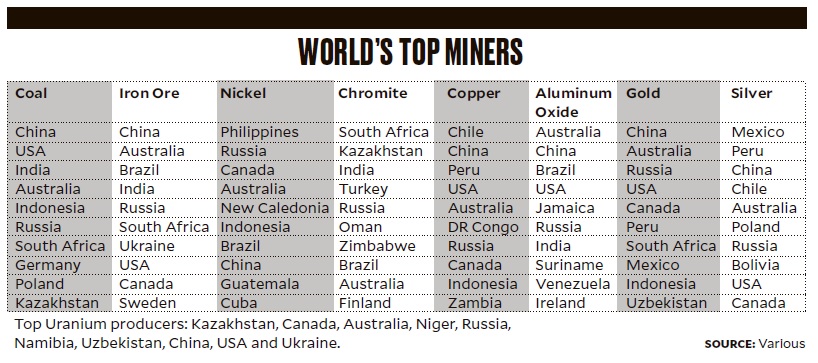Would banning mining jeopardize our quality of life?
March 29, 2017 at 10:15
Would banning mining jeopardize our quality of life?
Anti-mining groups proliferate these days. They want to ban mining because it is anti-environment. Do they really mean what they say?
Minerals and metals have been part of our way of life for thousands of years. Unless we go back to the Stone Age. Recall the Iron, Copper and Bronze Ages. Disclosure: I studied geology, mining and metallurgy courses at UP Diliman.
Homes
Let’s start with our homes. The refrigerator is made of steel. Stainless steel is made from iron, nickel and chromium. The tin cans for canned goods are made from tin and steel. The aluminum cans came from mined alumina. The glass we use is from silica sands.
And the house we live in is made from cement from limestone, steel bars and nails. And how will electrical appliances, like TV and air-conditioners, work without copper wires?
Transport
What are cars, ships, railways and planes made of? Cars cannot run without steel body, copper wirings, and batteries. Ship hulls are made of iron and steel. Add to that the cast-iron engines. Most airplanes are made out of aluminum, a lightweight metal. The Ford Tri-Motor, the first passenger plane from 1928, was made out of aluminum.
Infrastructure
The most extensively used material in transmission line is aluminum. Glass optical fibers are made from silica. An optical fiber is a single, hair-fine filament drawn from molten silica glass. These fibers are replacing metal wire as the transmission medium in high-speed, high-capacity communications systems.
Power
Some 32 countries use nuclear energy that uses uranium. Thirteen countries rely on nuclear energy for at least 30 percent of power generation.
What happens if coal mining is stopped now? Many power plants will cease operation. Power costs will rise. The Philippine economic growth will definitely slow down.
Jewelry
Diamonds are mined in Botswana, Russia and South Africa. Gold from many countries, including China, Australia, and Russia. Silver from Mexico, Peru, China and Chile. Emeralds and rubies are mined, too. Catholic churches use silver chalices.
We cannot do away with minerals and metals. Economics is important. But our way of life is at stake if mining is banned. In any case, mining comprised only 0.8 percent of gross domestic product (GDP) or P112 billion in 2016. Contrary to claims, it is not small. Palay had P289 billion of GDP, coconut, P93 billion and corn, P73 billion. Moreover, the beverage industry contributed P127 billion, clothing and apparel P70 billion, and transport equipment, P48 billion (Source: Philippine Statistics Authority).
Where do we go from here?
Mining per se is not bad. Best practices in mining can be learned from Canada, Australia and other places.
Mining companies must behave according to rules. The Australian Center of Sustainable Mining Practices (ACSMP) notes that sustainable mining practices embed the principles of sustainable development into a mining and minerals context.
“At its core is the belief that through the responsible development of the world’s mineral resources, the global population will be able to access the mineral resources they demand for both a higher standard of living and better access to energy. It is an important tool in alleviating poverty. Companies that exhibit sustainable mining practices demonstrate the five pillars: Leading environmental practices, community engagement and support, economic development, safety excellence and optimum resource utilization.” (ACSMP).
Have I visited mines? Yes. I visited Philex Mines in Benguet, Semirara Mine in Caluya, Antique, and TVI Mining in Siocon, Zamboanga del Norte. They are responsible miners.
Am I pro-mining? You bet. And pro-development.
Source: https://business.inquirer.net/226811/banning-mining-jeopardize-quality-life























